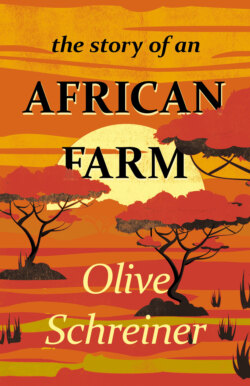Читать книгу The Story of an African Farm - Olive Schreiner - Страница 12
На сайте Литреса книга снята с продажи.
THE CONFESSION
ОглавлениеOne night, two years after, the boy sat alone on the kopje. He had crept softly from his father’s room and come there. He often did, because, when he prayed or cried aloud, his father might awake and hear him; and none knew his great sorrow, and none knew his grief, but he himself, and he buried them deep in his heart.
He turned up the brim of his great hat and looked at the moon, but most at the leaves of the prickly pear that grew just before him. They glinted, and glinted, and glinted, just like his own heart—cold, so hard, and very wicked. His physical heart had pain also; it seemed full of little bits of glass, that hurt. He had sat there for half an hour, and he dared not go back to the close house.
He felt horribly lonely. There was not one thing so wicked as he in all the world, and he knew it. He folded his arms and began to cry—not aloud; he sobbed without making any sound, and his tears left scorched marks where they fell. He could not pray; he had prayed night and day for so many months; and tonight he could not pray. When he left off crying, he held his aching head with his brown hands. If one might have gone up to him and touched him kindly; poor, ugly little thing! Perhaps his heart was almost broken.
With his swollen eyes he sat there on a flat stone at the very top of the kopje; and the tree, with every one of its wicked leaves, blinked, and blinked, and blinked at him. Presently he began to cry again, and then stopped his crying to look at it. He was quiet for a long while, then he knelt up slowly and bent forward. There was a secret he had carried in his heart for a year. He had not dared to look at it; he had not whispered it to himself, but for a year he had carried it. “I hate God!” he said. The wind took the words and ran away with them, among the stones, and through the leaves of the prickly pear. He thought it died away half down the kopje. He had told it now!
“I love Jesus Christ, but I hate God.”
The wind carried away that sound as it had done the first. Then he got up and buttoned his old coat about him. He knew he was certainly lost now; he did not care. If half the world were to be lost, why not he too? He would not pray for mercy any more. Better so—better to know certainly. It was ended now. Better so.
He began scrambling down the sides of the kopje to go home.
Better so! But oh, the loneliness, the agonized pain! for that night, and for nights on nights to come! The anguish that sleeps all day on the heart like a heavy worm, and wakes up at night to feed!
There are some of us who in after years say to Fate, “Now deal us your hardest blow, give us what you will; but let us never again suffer as we suffered when we were children.”
The barb in the arrow of childhood’s suffering is this: its intense loneliness, its intense agony.
